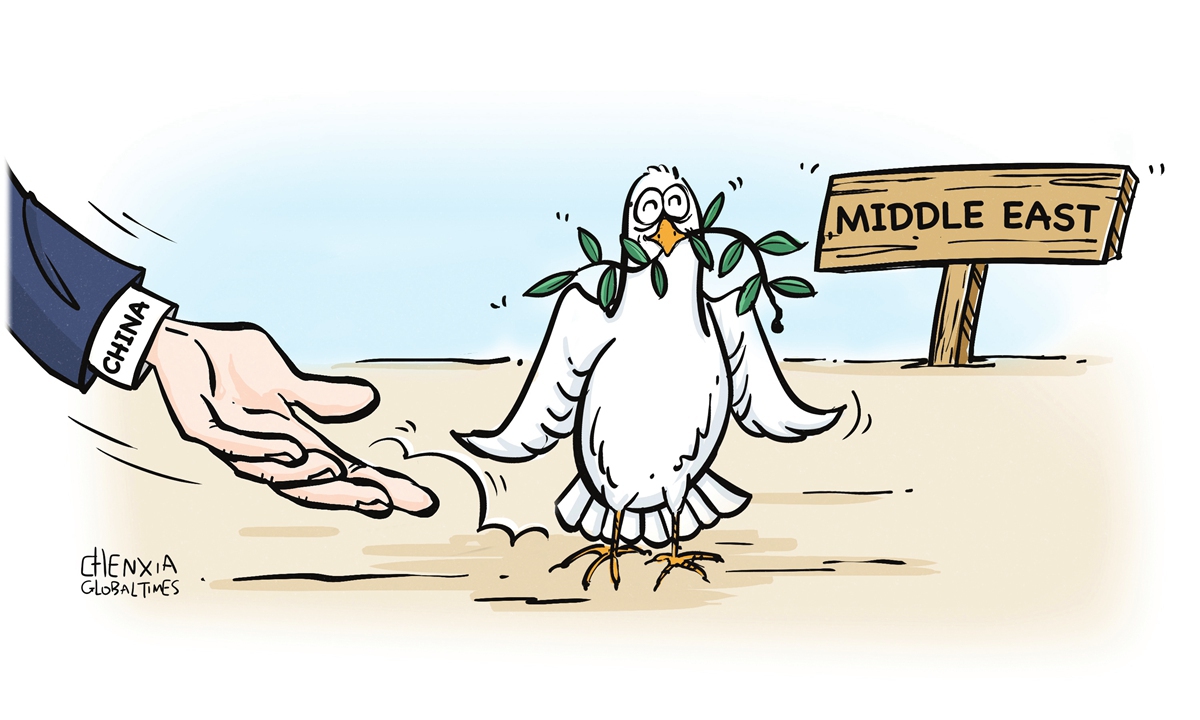Three key words for Palestinian reconciliation dialogue in China: justice, fairness, responsibility

Illustration: Chen Xia/GT
From July 21 to 23, representatives of 14 major Palestinian factions gathered in Beijing to sign the Beijing Declaration on Ending Divisions and Strengthening Palestinian National Unity, which attracted worldwide attention. Why did the Palestinian factions choose to hold a reconciliation dialogue in China? Three words can answer this question: justice, fairness, responsibility.
Justice. China has been able to successfully bring about significant progress in the reconciliation of all Palestinian factions because China has always upheld fairness and justice, while firmly supporting the liberation cause of the Palestinian people. Since the founding of the People's Republic of China, China has firmly supported the just cause of national independence and liberation of oppressed nations and regions, including Palestine. On the Palestinian question, China is indisputably a just partner of the Palestinian factions.
Fairness. China has been able to bring about significant progress in reconciliation among the Palestinian factions because it adheres to the principle of fairness in dealing with the Middle East issues. China has no axe to grind in the Middle East and, in the spirit of the Five Principles of Peaceful Coexistence, it has developed friendly and close relations with all countries in the Middle East. It always respects the sovereignty of other countries and enjoys a good reputation in the Middle East and the international community.
The 10th China-Arab States Cooperation Forum Ministerial Conference recently held in Beijing has remained an active platform over the past 20 years, a testament to the longstanding friendship and mutually beneficial cooperation between China and Arab states. At the same time, China has maintained good relations with all parties in the region. It does not rely on military coercion, but instead applies a long-term model based on equality, mutual benefit and common development. China does not take sides or favor certain countries. This allows it to build trust with all parties in the Middle East and work as an honest broker for all parties in the region, be it Saudi Arabia and Iran, or the different Palestinian factions. All of these parties have embraced China as a mediator because they see China as a trustworthy intermediary that doesn't fan any flames in the region.
Responsibility. China has been able to bring about progress in reconciliation among the Palestinian factions because China, as a responsible major country, has committed itself to world peace and common development in keeping with the purposes of the UN Charter. The Charter lists as one of the purposes of the UN "to develop friendly relations among nations based on respect for the principle of equal rights and self-determination of peoples and to take other appropriate measures to strengthen universal peace." On the question of Palestine, China bears no ulterior motives and stands only for justice. That is not only the aspiration of China and the Arab nations, but also the responsibility of the entire international community and all UN member states. In promoting intra-Palestinian reconciliation, China and a vast number of Arab and Islamic countries share the same objective. China is ready to strengthen communication and coordination with relevant parties and play a constructive role in maintaining peace and stability in the Middle East.
The author is a current affairs commentator based in Beijing. [email protected]
图说省实党建之窗
- 09-242787长斑点的香蕉还能吃吗 香蕉的营养价值有多高
- 09-242791去饭店必点的8道菜 在家也能做得如此好吃
- 09-242635牛仔骨10人有9人做不好教你5种简单美味的做法好吃极了
- 09-242470做焖面 面条蒸还是不蒸 看了您就知道了
- 09-241251高血脂能喝酒吗 高血脂可以喝红酒吗
- 09-24893没想到苜蓿还有这么多种吃法 做法简单还美味 先收藏了
- 09-24453冰糖雪梨水怎么熬 冰糖雪梨做法
- 09-242689藏在身边的“补脑冠军”,5种食物常做给孩子吃,头脑聪明成绩好
- 09-242564怀孕五个月腿抽筋怎么回事 怀孕五个月晚上睡觉腿抽筋
- 09-24175春节吃什么 中国春节吃什么


